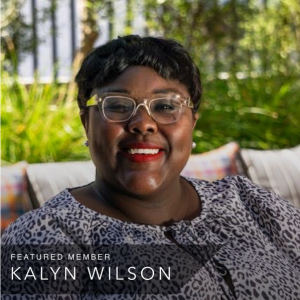
Kalyn Wilson is a perfect member to feature because she personally and professionally exemplifies the women in our member community. She is an optimistic, generous, thoughtful leader who uses her experience in HR and organizational development as a consultant to help companies better understand the benefit of Diversity and Inclusion for their companies.
Kalyn sees the Black Lives Matter movement as a teachable moment to help her white allies understand the history of systemic racism in the same way that we understand sexism and the role it plays in keeping women from rising up in the workplace. Kayln teaches a webinar she created – A Crash Course on Being An Ally to Black Folks-– for clients.
Tell us your work story : Who are you and what do you do?
I’m a witty, wise woman who’s influencing the field of HR for good. I use my extensive experience in Human Resources, Organizational Development, and Diversity & Inclusion to improve HR systems and amplify unrecognized talent.
You recently pivoted your career coaching practice to create programming for groups. How has this moment shaped your thoughts on what diversity and inclusion means.
Switching to groups means I get to multiply my impact on the world. Diversity and inclusion is a very sensitive topic for most of us, and I find that people feel more comfortable starting their D&I journey in the safety of a group. The shared energy can encourage people to share their thoughts or latch onto others’ “aha” moments to inspire their own. The group setting can accelerate learning. Plus, it’s just fun for me when I connect with large groups!
Why is it important to teach the history of the current protest?
It is critical to teach history, not just important. The issues at the center of the current protests are compounded layers of concerns, atrocities, and injustices dating back to the 17th century. That’s a lot of information to process, so I want to give non-Black people a crash course in how we reached this explosive point. I’ll share more than a simple recounting of key events; I’ll explain how the pivotal moments intersect and how these moments birthed the systemic issues permeating every layer of our nation’s racial experience – socially, politically, and financially.
Many people are confused about what language to use and how to interact on social media without being offensive or using outmoded paradigms to talk about race. What’s important to think about when trying to navigate these waters with empathy.
The smartest thing we can all do in this moment is to focus on strengthening our allyship within our sphere of influence. So many of us are functioning from a place of guilt, anxiety, and emotional overload. We try to outdo others and ourselves with the wittiest or “woke”-est statuses, just to impress or connect with strangers. This can be toxic – to us and others. Protect your emotional space and respect others’ emotional state by focusing on showing up in meaningful ways for your friends, family, and co-workers. Take a social media break if you need to or turn off the news. It’ll be worth it!
What is your proudest professional accomplishment?
My proudest professional accomplishment is pursuing a doctoral degree in Industrial-Organizational Psychology. It represents my commitment to continuous learning and growth, and it also boosts the visibility of underrepresented talent. (My dissertation research centers on optimizing the Black male employee experience.)
What advice do you have for other women looking to make a career change but are afraid or lack confidence? How is it on the other side?
Validate your fear but don’t let it define you. I always say emotions are simply signals; they show us what we need to heal so we can move forward! You can do this, even if you take baby steps to get started. It feels surreal to be on the other side of fear and diminished self-confidence. Sometimes I still feel impostor syndrome, but I try to keep a list of my accomplishments in an Excel spreadsheet so I can encourage myself in those moments.
Do you have any advice on how to craft a winning pitch?
Imagine yourself as if you’ve already sealed the deal… How do you feel? What do you see yourself saying when meeting with the client? Can you see their joy as they look at your work? Use this vision’s positive energy to put how you’d add value into words. The mind is powerful and excited energy is too.
What is the best piece of professional advice you’ve ever received?
Focus on progress not accomplishments. Achievement addiction can be toxic. When you understand your “why” and the meaning behind the steps you take in your career, you avoid burnout and losing yourself.
How do negotiate the balance between life and work when you are the one setting the boundaries?
I recognize that it’s an ongoing journey where I never quite “arrive”. I try to let this excite me rather than frustrate me. For example, the pandemic triggered all kinds of major life changes for me; they’ve led me to pursue more creative outlets and change up my workout routine. It wasn’t expected (or welcome at first), but I can see how they’ll produce tons of long-term benefits.
How do you make work work for you?
Wow… My answer to this today is so different than what I would have said three months ago. For work to work for me, I have to experience freedom – intellectually, creatively, and emotionally. I need to own my thoughts and my work, so I’ve been working on my communication skills to be an even stronger advocate for myself professionally. I firmly believe we teach people how to treat us by what we allow. How I set boundaries and communicate my professional needs to others sets the tone for our relationship and my work. That’s why I want to speak up for myself even more.
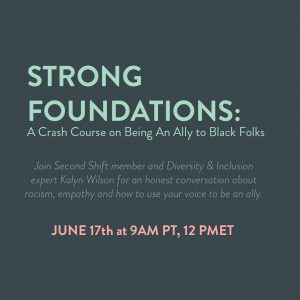


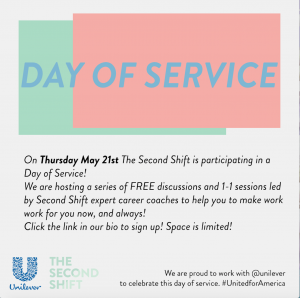
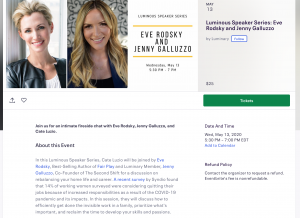
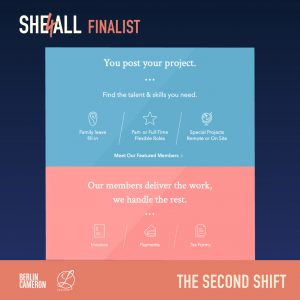

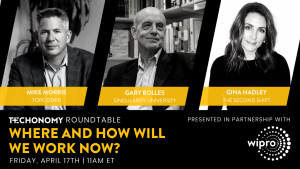 We’re at home, we’re productive, and many of us are getting used to it. Will this or something like it become the new reality for business? How much more flexible can the future workforce become? Join my co-founder
We’re at home, we’re productive, and many of us are getting used to it. Will this or something like it become the new reality for business? How much more flexible can the future workforce become? Join my co-founder